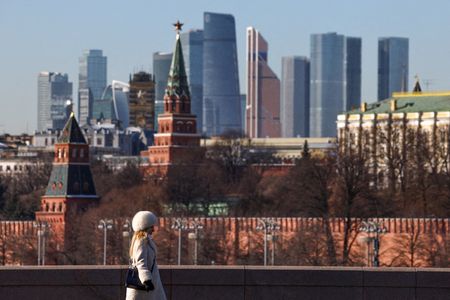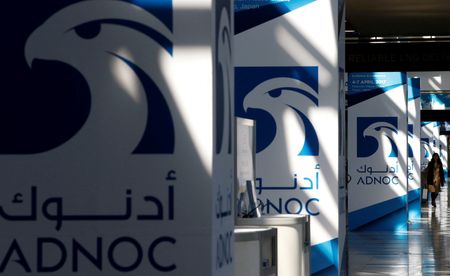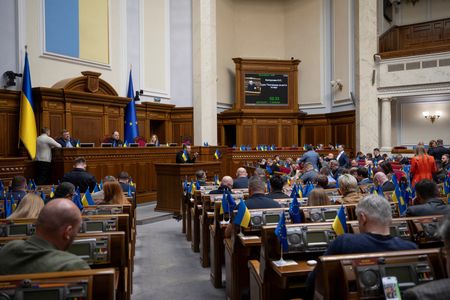By Jan Strupczewski
BRUSSELS (Reuters) -The Russian economy is in an increasingly precarious state as a result of a shift to a war mode and of Western sanctions over Moscow’s invasion of Ukraine, a report by the Stockholm Institute of Transition Economics (SITE) said on Tuesday.
The report, prepared for talks of European Union finance ministers, said that while still relatively stable, the Russian economy was only superficially resilient and that underlying imbalances and structural weaknesses were growing.
“The fiscal stimulus of the war economy has kept the economy afloat in the short term, but the reliance on opaque financing, distortionary resource allocation, and shrinking fiscal buffers makes it unsustainable in the long term. Contrary to Kremlin narratives, time is not on Russia’s side,” it said.
The EU has imposed 16 packages of sanctions on Russia since the start of the war in Ukraine in February 2022, targeting Moscow’s main sources of revenue – oil, gas and coal exports. Other Western powers, including the United States, Canada, Britain and Japan also imposed sanctions.
Keen to show Western sanctions are pointless, Russia says its gross domestic product grew 4.3% in 2024 after 3.6% expansion in 2023.
But Torbjorn Becker, who presented the SITE report to EU finance ministers, said Russian GDP numbers could not be trusted because Moscow was most likely strongly understating inflation which affected real GDP calculations.
“Russia claims inflation is 9-10%. Why would they then have a policy rate of 21% at the central bank? Which regular central bank would have a policy rate that’s basically 11.50 percentage points higher than the inflation rate? If any of our central banks were doing something like that, they would be out of their job the next day,” Becker told reporters.
“That’s a very clear indication that inflation may not actually be the right number. If you understate inflation, you will then overstate real GDP numbers,” he said.
LIKELY HIGHER BUDGET DEFICIT
He also pointed to Russia’s budget constraints caused by falling revenues from oil, gas and coal and rising military spending. Since the start of its invasion of Ukraine and despite its massive war effort, Russia has been reporting a budget deficit of 2% of GDP every year.
“Fiscal numbers in Russia don’t really correspond to what we think that they are putting into the war effort,” Becker said.
He said much of the financing of the war machine was going through the banking system. “So if you add that to the fiscal numbers, their fiscal deficits would be ballpark twice as high as what they have shown in the official statistics,” he said.
This, in turn, was building up financial risks in the banking system, Becker said, because banks were reporting high credit growth.
“These are all indicators that we usually look at when we want to predict the banking crisis,” Becker said.
European Economic Commissioner Valdis Dombrovskis said the European Commission agreed with the SITE report.
“Their analysis highlights the unreliability of Russian statistics, and how the Russian economy is not performing as well as its official statistics suggest,” Dombrovskis told reporters after the EU ministers’ meeting.
“The Commission broadly agrees with this analysis and the overall increasing fragility of the Russian economy. This underlines the importance of the international community’s ongoing efforts to limit the Kremlin’s capacity to continue its war of aggression against Ukraine,” he said.
(Reporting by Jan StrupczewskiEditing by Tomasz Janowski)











